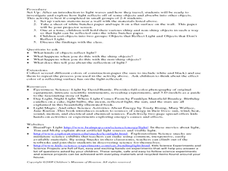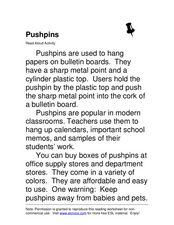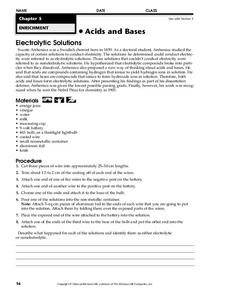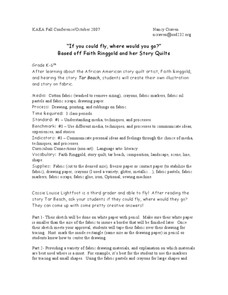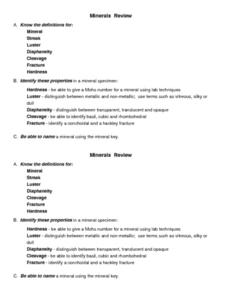Curated OER
Analyzing Oxidation-Reduction Reactions
In this oxidation-reduction reactions learning exercise, students read about reactions where elements gain and lose electrons. When elements gain electrons they are reduced and when the lose electrons the elements are oxidized. They are...
Curated OER
Elements Compounds and Mixtures
In this science worksheet, students apply science basic knowledge of chemistry to the puzzles that are listed for the four parts of the sheet while focusing upon the identification of a metalloid.
Curated OER
Writing Half Reactions
In this half reactions worksheet, students read about redox reactions and learn how to write half reactions showing the oxidized part of the reaction and the reduced part of the reaction. Students are given 10 redox reactions and they...
Curated OER
Light Reflections
Young scholars explore light. In this physical science light lesson, students display objects on a projection screen and investigate how light absorbs, refracts, transmits and reflects. Young scholars discuss common features of...
Curated OER
Charge and Electricity
For this electricity worksheet, students read about electric charge, ionic notation, and conductors and insulators. Then students complete 19 matching, 6 fill in the blank, and 2 short answer questions.
Curated OER
Naming and Covalent Compounds
In this compounds worksheet, students practice naming compounds and classifying them as ionic, covalent, or polyatomic compounds. This worksheet has 12 fill in the blank and 12 problems to solve.
Curated OER
Naming and Covalent Compounds
In this naming and covalent compounds learning exercise, students name 12 compounds using a chart of polyatomic ions if needed. They also draw covalent bonds in 6 compounds and answer 6 questions about ionic bonds, covalent bonds and...
Curated OER
Pushpins--Read Aloud Activity
In this read aloud instructional activity, 2nd graders read a passage about pushpins and their function. This passage is on a second grade reading level. There are no questions with this instructional activity.
Curated OER
Water the Universal Solvent
In this water and solvent worksheet, students answer 20 questions about solutes, solvents, polarity in molecules, and the characteristics of water as a solvent. Students answer 3 questions about the lab they completed using temperature...
Curated OER
WHAT'S ORGANIC?
Young scholars explore how certain foods come to be certified "organic." They write the words "organic" and "synthetic" and given the definitions of each. Students are given dictionaries. They are asked: "What is organic food?" Young...
Curated OER
Acids and Bases
In this acids and bases worksheet, students conduct an experiment to determine if solutions are electrolytic or nonelectrolytic. After completing the experiment, students answer 1 short answer question.
Curated OER
If You Could Fly, Where Would You Go?
Students explore story quilts. In this cross curriculum literacy and art lesson, students listen to the story Tar Beachand discuss the art form of story quilts as used by Faith Ringgold. Students sketch their own "Where Would You Fly?"...
Curated OER
Applied Science - Physics Lab
Students investigate electricity. In this Physics lesson, students experiment with insulators and conductors of electricity. Students use batteries as the energy source for the experiment.
Curated OER
Rechargeable Batteries
Students explore how rechargeable batteries work by conducting a series of experiments. In this physics instructional activity, students discuss the benefits of using rechargeable batteries over disposable ones. They build their own...
Curated OER
Edible Atom/Molecule
Upcoming chemists construct atom or molecule models out of candy. This is a classic idea that learners really enjoy; however, this lesson plan is vague. There is no instruction about the structure of atoms or molecules. Make sure you...
Curated OER
Characteristics of Crystals
In this crystals worksheet, students complete a graphic organizer by filling in the characteristics of the different crystal types including melting/boiling point and electrical conductivity.
Curated OER
Naming Inorganic Compounds
In this compounds worksheet, students read about the rules for naming inorganic compounds. Then students complete 2 graphic organizers by filling in the compound name, formula, and anion name.
Curated OER
Molecular Models
For this molecular formula worksheet students fill in a table describing elements and chemical formulas. They identify, elements by type and how they bond. The student analyze molecular formulas to identify the number of atoms and if the...
Curated OER
Naming Inorganic Compounds
For this inorganic compounds worksheet, students complete 2 charts by writing the names or chemical formulas of given ionic and covalent compounds.
Curated OER
Minerals Review
In this earth science worksheet, students review the basic characteristics of minerals in the common categories of them all.
Curated OER
Grade 9 Science Review
In this 9th grade science review worksheet, students complete 63 true or false questions on topics such as atomic notation, isotopes, covalent bonds, Ohm's law, and electric circuits.
Curated OER
Reading Comprehension Worksheet: Compounds & Elements
For this reading comprehension worksheet, students read several short paragraphs about compounds and elements and then answer several questions about the text.
Creative Chemistry
Physical and Chemical Trends in the Group 7 Elements
In this elements worksheet, students complete a graphic organizer by comparing the elements' melting point, boiling point, density, and electronic configuration. Students determine the characteristics of Group 7 elements. This worksheet...
Curated OER
Chemical Families Quiz
For this chemical families worksheet, students answer 8 multiple choice questions including identifying characteristics of families in the periodic table and answering specifics about each family.



